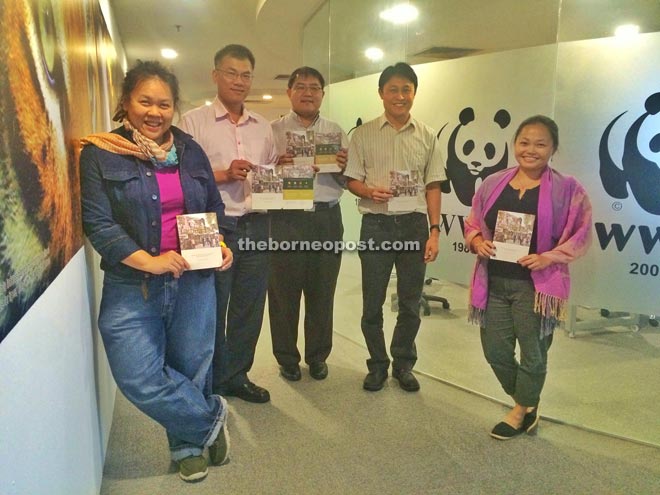
Kang (centre) flanked by Chan (second left), Hon and staff members of WWF-Malaysia Sarawak office hold the flyers promoting the ‘Kuching For Me’ contest.
KUCHING: For Dr Henry Chan, Kuching is the seat of power.
The Worldwide Fund For Nature (WWF) Malaysia head of conservation for Sarawak zooms in on how the capital city has become home to many top decision-makers, from both government and private sectors.
He stated this when presented with the question ‘What is Kuching for You?’ under Vanadium Land’s ‘Kuching For Me’ contest.
“In terms of shaping public opinion and how it would help towards formulating better resource management of the state, these are the people whom we should really capture,” he told The Borneo Post and property manager Kelvin Kang, who is also the contest organiser.
“These are the people who should play a role in shaping how the rest of the state is managed in terms of natural resources and environment,” added Chan, who is also WWF-Indonesia Heart of Borneo leader.
The Sibu-born, who had stayed in several parts of Malaysia, said Kuching remained one the better cities in the country in terms of accessibility and living standards.
“It’s a nice place to live. We have all the amenities that we need.”
He, however, said he would like to see more public spaces where people could get together to talk without fear of being chased off.
Proving that Kuching could mean different things to different people, WWF-Malaysia Sarawak conservation programme leader Jason Hon went into discussing how the city was also home to diverse groups of people and a long history.
“The people give it character; this makes this place really special.”
The natural surrounding and easy access to interesting locations also gave Kuching a unique advantage, he added.
“Not too far (from Kuching) are the little towns and bazaars with rich history – they give value to Kuching. It’s possible to go to Bako or Kubah for a day trip. Where else can you do this?”
Hon also reminisced about former open spaces where people used to be able to play football, throw a frisbee around or take the dogs out for a stroll here.
“There’s no such place for those anymore. Now, all these places are being taken up for development – some are even left unmanaged. It doesn’t make sense to take away public parks and facilities,” he said, noting that that running and cycling tracks were only catering to a small group.
“The only places (where) the children can go now are cyber cafes, or they would just stay home and play games. They don’t get a chance to be outside.”
Hon would also like to see a more comprehensive waste management system implemented here.
“The next thing that needs to improve is for people to segregate the waste, as well as not throw too much out.”
The contest, run by property developer Vanadium Land, wants to hear what Kuching means to its people. Anyone above 12 years of age can take part.
All they need to do is to write an essay starting with ‘Kuching for me is…’, keeping it under 1,000 words. Send it in with either two photographs, a short film (no more than three minutes in duration), a montage or a storyboard.
Entries can be submitted via www.kuchingforme.com and must reach the secretariat by this Sept 30.
A cash prize of RM5,000 awaits the grand winner, while those placing second and third will receive RM2,500 and RM1,000, respectively. There will also be 27 consolation prizes forth RM100 each.
For further details, go to www.kuchingforme.com or visit Facebook page ‘KuchingForMe’.
